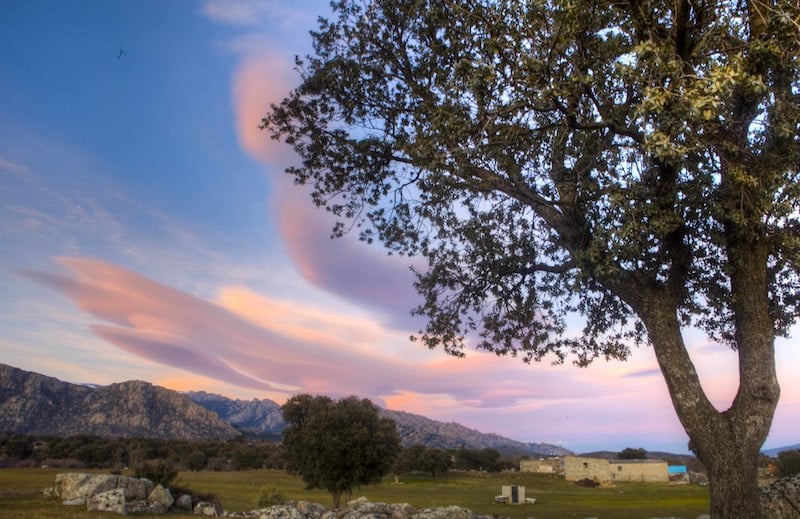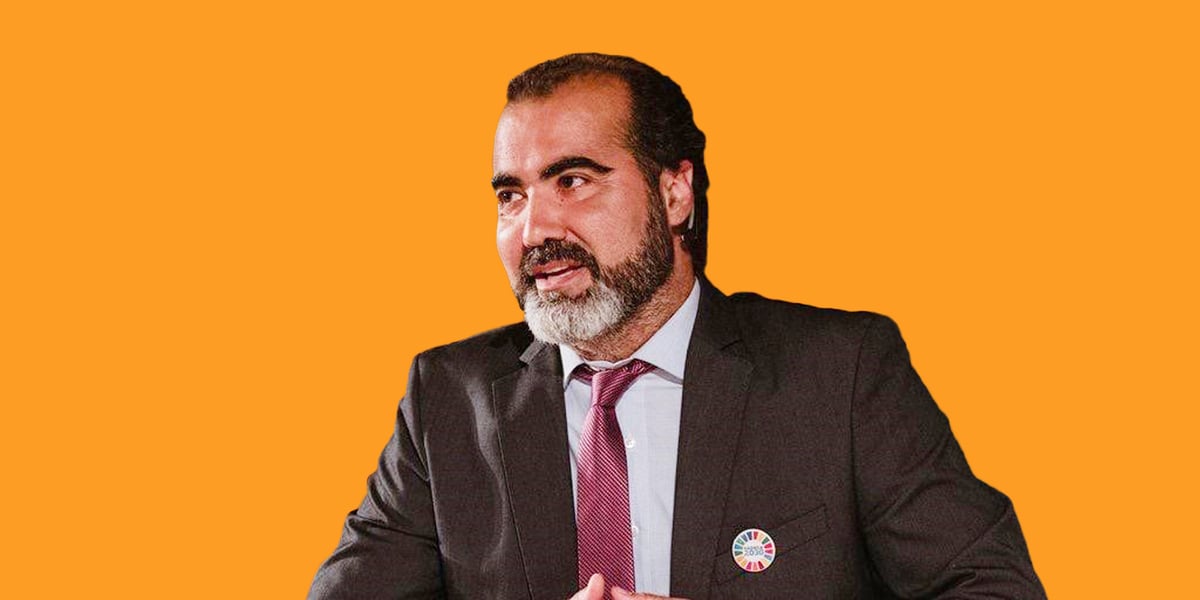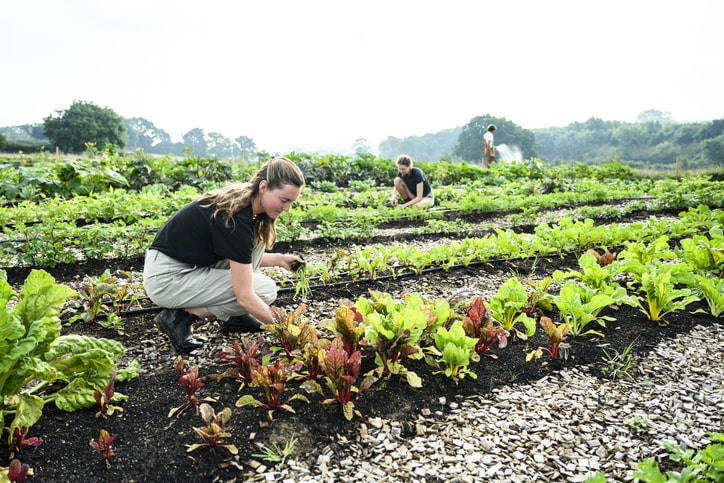Wednesday, July 13, 2022
By Esther Peñas
Spurred by his admiration and respect for nature, Javier de los Nietos studied environmental biology at the Complutense University of Madrid before his vocation led him to revitalize local agroecological initiatives at Terrae Network, an organization that promotes rural sustainability. Landscape recovery, agricultural biodiversity conservation, improving food quality and sovereignty, and creating rural employment opportunities are the backbone of his career today. Since 2011, the biologist has been the head of the El Boalo-Cerceda-Mataelpino local council, the region of Madrid where he was born in 1978. A municipality that has become a benchmark for sustainability at the national level thanks to its organic composting, door-to-door garbage collection, and school initiatives that teach children about coexisting with nature. As a result of these projects, the municipality has won, among other awards, the Cultura Viva National Circular Economy and Zero Waste Award and the Conama Sustainability Award. We spoke with him to find out how this strategy was developed and what his plans for the future are.
The municipality of El Boalo, which has 8,200 inhabitants, has managed to become an example of sustainability. Some will say that this is due to its small population. To what extent does the number of inhabitants have an influence?
It’s very influential: the fact that the protagonists of these projects know each other is essential to building each change. When a company or a marketing campaign promotes new routines and attitudes or activities, it doesn't have the same effect as when a person that everyone knows and has a personal relationship with promotes these changes. This affects the municipal government itself - made up of people known by all their neighbors - as well as school management.
The local council is committed to bio-composting, bio-waste separation, and recycling - tell us more about these practices. I believe the local council even provides residents with individual composting machines.
That's right. Let me say that the composting process is natural, it’s not carried out by any type of machine. A composter is nothing more than a container where we deposit household biowaste that we add a structuring agent to (prunings, grass, or shreds of wood such as wood chips), which gives the mix a higher air percentage. We also regulate the humidity, so that the process temperature is very high, and the product is sanitized. This eliminates any pathogens and seeds that may be in the final compost. This lets us transform organic materials from our household waste into food for the soil. We give back to the earth so that it can feed us again in a circular economy cycle. What the local council does is provide families with these containers and training so that they can carry out this process without any issues, accompanying them during the first six months and clarifying any doubts they might have. One of the first steps to being sustainable is working with families.
What about bio-waste and recycling?
In these pilot projects that affect specific neighborhoods or families, we provide technical solutions. For example, we have detected that there are areas that the garbage truck has a hard time accessing or where there isn’t any space to place containers on the street. What we do is door-to-door garbage collection, something that was already done in the north of Spain and that we offer to our neighborhoods free of charge. In addition, we reward those who maintain their commitment to sustainability with a garbage tax credit.
Your sustainability strategies range from services that are practically individualized - such as the door-to-door garbage collection you just mentioned - to the smart use of technology, and imaginative initiatives such as using a municipal herd to clean up crop stubble. What role does innovation play in this transformation?
It plays a fundamental role. In the end, if we want people to change their habits and avoid the inertia of their daily routines, they need to feel drawn to projects that are convincing and motivating. Using our imaginations to create or determine these innovations is essential to this. For example, we’ve turned to popular and traditional knowledge to help us achieve a circular economy, knowledge that is a basic and fundamental part of any rural town. We don't want people to stop listening to the cowbells, children to stop knowing where eggs come from or people to stop knowing where their milk comes from. And if we want to do this, we have to maintain certain activities, even if it costs us money, or requires that people put in more effort and work. We have to maintain these traditional activities, because if we lose our cultural identity as a village, we’ll cease to be a rural area and become a residential area, like any other neighborhood on the outskirts of Madrid.
Many of these activities only work if citizens are actively involved. How have you been able to ensure that they will keep up this commitment?
There's a degree of resistance that will always be there. We know it's there, but regardless, we work with families and schools, because we believe that they will be future drivers of change. We try to involve children in the changes we want our society to make in the future. We want to reach out to them and involve them in achieving these changes.

Younger populations play a key role in ecological transition. What initiatives have been carried out in El Boalo’s high schools? What role does environmental education play here?
We make huge investments in this area. Within public schools, we contract an environmental education service that is in contact with all the schools in the municipality -there are three of them, with three different administrations- offering them cross-cutting education and training, because environmental education has to be an interdisciplinary part of pedagogical curriculum. When we hire reinforcement personnel from public administrations, we try to hire people that are unemployed, so that they have the chance to become part of the school staff. This makes them much more motivated, and this motivation helps drive activities such as Climate Change Week in the schools. We were able to have students from our secondary schools participate as guests at the COP in Madrid in 2019. For us, these small milestones, like going with them to summits and congresses, will never be forgotten. Besides being an extraordinary experience, it was also some of our students’ first flight or trip. And it’s our sustainability project that has led our students to have these types of unforgettable experiences, a project that allows them to reflect on the future of the planet and allows all of us to build a better future. I don't know if these experiences will influence our students’ professional futures, but it will certainly influence their attitudes as responsible citizens of our society.
What strategies have been followed to promote the circular economy? What do you think is the key to achieving zero waste?
The first key is perception, and to change this we have to work on consumption habits, reducing waste production by reusing and repairing. From there we can talk about waste treatment, composting, etc. Reuse is basic to all of this, and while selling and buying second-hand products is something that is now fashionable, we've been doing it for five years through an app. Any neighbor can give away their things so that other neighbors can give them other uses or prolong their useful life. We want to expand this service with a repair shop, so that residents can repair their tools and use them for longer. The objective is to raise awareness so that we stop being a throwaway society, with a linear and consumerist economy.
One of the initiatives resulting from the participatory budgets is the promotion of sustainable mobility. In fact, a new charging point for electric vehicles was recently installed. How have residents responded to this?
We're satisfied with the introduction of this type of car, but we need to work more to promote car sharing. It's true that the pandemic made it difficult to do car sharing, because of social distancing, masks, etc., but we’re making progress, and our residents are becoming increasingly aware of how much time and fuel they can save with this practice. We've installed five recharging points for electric cars in the municipality, and the Local Council offers a motor vehicle tax credit for electric or hybrid cars. This has motivated many residents to switch to a different type of vehicle, together with the national "Move plans", which offer tax credits to those who choose this type of vehicle. But we still use transportation in a very individualistic way. People may switch to more sustainable cars, but in the end, they don't use them in different ways.
Of all the initiatives that you've promoted, which ones are you particularly proud of?
I’m proud of the way our residents have responded, because the projects we’ve promoted might not have had any social impact. However, the response has been very positive and committed, and this has enabled the project to grow inside and outside the municipality. That’s why it’s hard for me to single out only one initiative. We’re talking about the circular economy, about a virtuous cycle in which all the pieces are essential and important, as they come together to make a coherent project that works. Now more pieces need to be added to the puzzle to make the project increasingly sustainable.
Is tourism to El Boalo, Cerceda, and Mataelpino also sustainable?
As president of Adesgam, the Sierra de Guadarrama Development Association, which brings together the 14 local councils located in the National Park to develop composting or mobility projects, I can say that we’re involved in a very important European Civis project on carbon neutrality. We’re offsetting 100% of the emissions that may be produced by tourism to our destination with international cooperation projects. So we’re able to guarantee that all visits to our tourist destinations in the Guadarrama National Park generate zero carbon emissions due to this offset.
¿Te ha parecido interesante?





